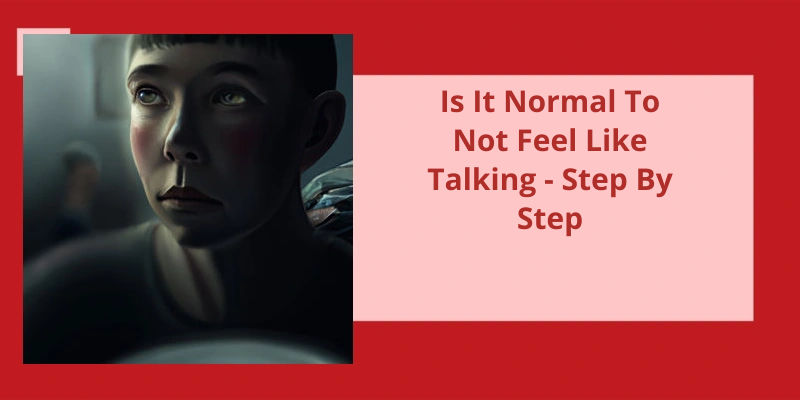In a world constantly buzzing with social interaction and communication, it may seem strange or even concerning to not feel like talking. However, the truth is that everyone experiences periods of introversion or a desire for silence from time to time. Whether due to personal circumstances, emotional states, or simply a need for solitude, it’s perfectly normal to not feel like engaging in conversation. Understanding the reasons behind this inclination can be beneficial in accepting and embracing moments of quiet contemplation, and in navigating the societal pressures that often surround communication. This step-by-step guide will explore the various factors that contribute to not feeling like talking, offer insight into the potential benefits of solitude, and provide practical strategies for navigating these moments while maintaining balance and connection. So, if you find yourself questioning the normalcy of not feeling like talking, join us as we delve into this natural aspect of the human experience, and discover how to honor your own needs for silence and introspection.
Why Do Sometimes I Don’t Feel Like Talking to Anyone?
Why do we sometimes not feel like talking to anyone? It could be a sign that you’re an introvert. Many people mistakenly believe that introversion is synonymous with shyness or social anxiety. However, being an introvert simply means that you find social interactions draining and instead draw energy from your inner world. It isn’t unusual for introverts to prefer solitude and avoid unnecessary conversations with others.
Introverts typically thrive with alone time, as it allows them to recharge and process their thoughts and emotions. Social interactions, on the other hand, can be mentally and emotionally exhausting for introverted individuals. This doesn’t mean they never want to talk or socialize, but they may feel a strong need for solitude and silence to recharge their energy levels.
For introverts, quiet contemplation and introspection are significant parts of their nature. They often prefer deep, meaningful conversations with a few close friends or family members rather than engaging in small talk or superficial chitchat. They seek quality over quantity when it comes to social interactions, and may feel a lack of interest or energy to engage in casual conversations with acquaintances or strangers.
It’s not something that needs to be fixed or changed. So, if you find yourself not feeling like talking to anyone at times, it could be a sign that you’re introverted and just need some time alone to recharge and connect with your inner self.
Remember, introspection and solitude aren’t signs of loneliness or social inadequacy. They’re essential elements for introverts to maintain balance and well-being. Embrace your introversion, honor your need for alone time, and surround yourself with understanding individuals who respect your need for silence and solitude.
It’s natural to have moments when we simply don’t feel like engaging in conversation. Whether it’s because we’re experiencing a bout of introspection or we just need some time to ourselves, it’s important to remember that being a quiet listener is perfectly acceptable. As long as we’re not being intentionally rude, there’s no harm in taking a step back and choosing not to participate in the conversation.
Is It Okay to Not Feel Like Talking Sometimes?
Is it normal to not feel like talking sometimes? Absolutely. We all have moments when we crave solitude and silence. In a world filled with constant noise and stimulation, it’s natural to long for moments of quiet reflection. It’s okay to embrace those times when we need to recharge and be alone with our thoughts.
But theres nothing wrong with being the quiet listener from time to time. Some individuals are more inclined to observe and absorb rather than actively engage in conversation. It’s perfectly acceptable to be the one who listens attentively, soaking in the conversations happening around. This can be a valuable skill, as it allows us to gain insights and perspectives from others without feeling the need to interject.
And theres nothing wrong with refusing to participate in the conversation if we don’t feel like it, as long as weren’t purposefully rude to anyone. Sometimes, we might be tired, not in the mood, or simply unable to find the right words to contribute to the discussion. We shouldnt force ourselves to speak when we arent ready or willing. It’s important to honor our boundaries and respect our own needs. As long as we approach this situation with kindness and respect towards others, there’s no harm in taking a step back and choosing not to engage verbally.
However, it’s crucial to differentiate between temporary feelings of not wanting to talk and persistent withdrawal or isolation. If we constantly find ourselves avoiding conversations and interpersonal interactions for an extended period, it might be a sign of underlying issues such as anxiety or depression. In such cases, it’s advisable to seek support from loved ones or professionals who can help navigate these challenges.
Embracing moments of quiet observation and choosing not to participate in a conversation from time to time can be valuable for our well-being. As long as we maintain respect and kindness towards others, it’s healthy to honor our own need for solitude and silence. However, it’s essential to monitor our behavior and seek help if our withdrawal from conversations becomes persistent and affects our overall functioning.
Coping Mechanisms for Dealing With Social Anxiety or Discomfort in Conversations
- Practicing deep breathing exercises
- Engaging in regular physical exercise
- Using positive self-talk and affirmations
- Practicing mindfulness and meditation
- Gradual exposure to social situations
- Seeking support from friends, family, or support groups
- Learning and using relaxation techniques, such as progressive muscle relaxation
- Challenging negative thoughts and replacing them with more positive ones
- Seeking professional help, such as therapy or counseling
- Developing and maintaining healthy lifestyle habits
Source: Is it bad if I don’t feel like talking?..
Our brains are wired to detect potential threats, and social situations can trigger this response. Feeling nervous or anxious in social settings is a common experience for many people. However, when these feelings become overwhelming, they can greatly impact our desire to socialize.
Why Do I Not Feel Like Socializing Sometimes?
It’s important to remember that everyone experiences periods of not feeling like talking or socializing from time to time. This can be influenced by a variety of factors, such as stress, mood, energy levels, or even just a need for personal space. It isn’t uncommon to have moments when you simply crave some alone time or find solace in solitude.
Anxiety, however, is a major contributor to this feeling. Feeling anxious can make socializing feel like an overwhelming and unbearable experience. The constant worry about saying the wrong thing, being judged, or feeling self-conscious can create a strong aversion to social situations. In these instances, it’s completely normal to want to avoid situations that trigger these anxieties.
It’s important to note that feeling nervous in social situations is also a natural response. We all experience moments of social anxiety, and it’s something that many people can relate to. It’s when these feelings become excessive or interfere with our daily lives that it may be necessary to seek professional help.
While it’s okay to have periods of not feeling like talking or socializing, it’s also essential to maintain a healthy balance. Social interactions play a significant role in our overall well-being and can provide valuable connections, emotional support, and personal growth. Finding a middle ground and understanding your limits is key.
Remember, it’s perfectly normal to have moments when you don’t feel like being social. Be kind to yourself, honor your boundaries, and prioritize self-care. If your feelings of not wanting to socialize persist or worsen, consider reaching out to a mental health professional who can provide guidance and support.
It’s perfectly normal to have days where you don’t feel like talking. In fact, taking time away from people and immersing yourself in your own thoughts can be incredibly rejuvenating. There’s no rule that says we’ve to constantly engage in conversation or participate in the buzz of daily chatter.
Is It Normal to Have Days Where You Don’t Want to Talk?
Is it normal to have days where you don’t want to talk? Absolutely. It’s important to remember that everyone has their own natural ebb and flow when it comes to social interactions. Some days, you might feel energized and engaged, while on other days, you may simply not have the desire or energy to engage in conversation. This is completely normal and it doesn’t mean that anything is wrong with you.
Sometimes, being away from people and holding your own thoughts for a few days can be one of the most refreshing forms of therapy. It allows you to recharge, reflect, and regain your mental and emotional energy. It’s essential to listen to your body and minds needs, and if that means taking a break from talking and focusing on yourself, it’s perfectly okay.
It’s important to remember that there are no requirements in the human handbook that say we’ve to keep conversations going or participate in the talk of the day. Each individual has their own unique preferences and comfort levels when it comes to social interactions. Some people might thrive on constant communication, while others may need more solitude and silence. It’s all about honoring your own needs and finding the balance that feels right for you.
Additionally, not feeling like talking doesn’t necessarily mean that something is wrong with your relationships or social skills. It’s just a natural part of human experience to have moments when you prefer to be quiet and introspective. We all have our own ways of recharging and finding solace, and sometimes that involves stepping back from socializing and embracing moments of silence.
So, whether it’s a day or a few days where you don’t feel like talking, remember that it’s completely normal and valid. Embrace the opportunity to connect with yourself, reflect, and recalibrate. Use this time to engage in activities that bring you joy, whether it’s reading, spending time in nature, or simply being alone with your thoughts. It’s all part of the beautiful tapestry of being human.
It’s completely normal to sometimes not feel social or experience moments of shyness or social insecurity. Making friends and developing social skills is something that everyone learns over time. The great thing is that anyone can acquire and improve these skills with practice and determination. So, if you’re feeling socially challenged, remember that you’ve the power to learn and grow in this area.
Is It Normal to Not Feel Social Sometimes?
Is it normal to not feel social sometimes? Absolutely. Many people experience periods of not wanting to engage in conversation or social activities. Shyness, social insecurity, and difficulty making friends are common issues that can affect individuals of all ages and backgrounds. It’s crucial to recognize that these challenges are nothing to be ashamed of, as they’re experienced by many.
The reality is that social skills aren’t innate; they develop over time. Just like any other skill, they can be learned and improved upon. While it may feel intimidating or daunting, there are steps you can take to enhance your social abilities. It starts with understanding and accepting yourself, acknowledging that feeling less social at times is perfectly okay.
Step by step, you can gradually work on conquering social anxiety and building connections. Begin by identifying your personal strengths and interests. By focusing on what you enjoy and feel confident in, you can find common ground with others and initiate conversations based on shared topics.
Additionally, practicing active listening is crucial in maintaining meaningful interactions. By truly engaging in conversations and showing genuine interest in others, you’ll create stronger connections and foster a more comfortable social environment. It’s important to remember that building relationships takes time and effort, so be patient with yourself and others.
Lastly, finding a supportive community or seeking professional guidance can be immensely beneficial. Surrounding yourself with individuals who understand and share similar experiences can provide a safe space for personal growth. Furthermore, seeking the help of a therapist or counselor can help you navigate social challenges and develop coping strategies to overcome any obstacles you may encounter.
By acknowledging and accepting these feelings, and taking small steps towards improvement, you can enhance your social skills and feel more comfortable in various social settings.
Conclusion
In conclusion, it’s completely normal to not feel like talking from time to time. There are various reasons why someone may experience this, ranging from introverted tendencies to specific life circumstances or emotional states. It’s important to understand and respect our own need for solitude or silence, as well as to create understanding and acceptance within our social circles. While communication is an essential part of human connection, it’s equally vital to prioritize our mental and emotional well-being. By recognizing and validating our own feelings and needs, we can navigate this aspect of our lives with patience, self-care, and open communication with those closest to us. So, on those days when you just don't feel like talking, remember that it’s normal and okay, and take the time you need to recharge and find your own inner peace.






